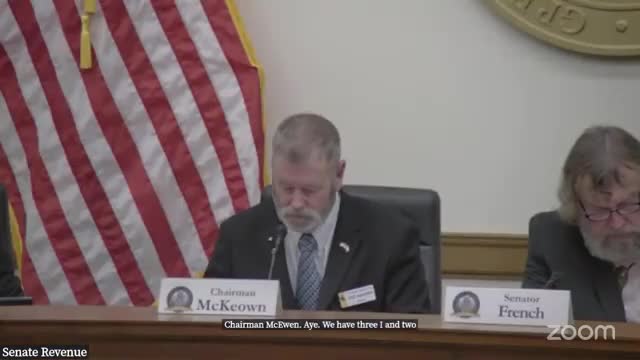Committee clears $50,000 business personal-property exemption but leaves reporting clarity unsettled
Get AI-powered insights, summaries, and transcripts
Subscribe
Summary
The Revenue Committee approved Senate File 48, which exempts small amounts of business personal property from taxation (a $50,000 exemption). Committee members and assessors debated whether the exemption applies per report, per account, or per business entity and asked the Department of Revenue for fiscal analysis by company; the bill passed 4–1.
The Revenue Committee on Oct. 12 approved Senate File 48, a measure creating a $50,000 exemption for business personal property, but members and county assessors asked the Department of Revenue to clarify whether the exemption applies per assessor report/account or per business entity.
Ken Gill of the Department of Revenue told the committee he drafted the fiscal note on a per-report basis: each assessor report would receive the exemption. He warned that the committee must decide whether the exemption should be calculated per account (per report to a county assessor) or per company, since a single business may report property in multiple tax districts and counties.
Gill illustrated the issue using a propane distributor with tanks in multiple districts: under a per-report approach the operator could receive multiple $50,000 exemptions depending on how accounts are reported; under a per-company approach the exemption would be applied once and apportioned across accounts. Gill said he could try to run alternate fiscal estimates by company but cautioned the results might be imprecise because of naming conventions and reporting practices.
County assessors pressed for clarity about administration and asked whether the exemption would change reporting requirements. Dixie Huxtable, a county assessor, said the bill as written appears to allow multiple $50,000 exemptions if separate business names or accounts are used. She and other assessors urged clarifying statutory language so counties can administer the exemption consistently and equitably.
Industry groups testified in support. Brett Moline of the Wyoming Farm Bureau Federation said the bill appears to grant the $50,000 exemption per county report under current drafting and that, if that is the committee’s intent, assessors should be informed. The Petroleum Association of Wyoming and Wyoming Mining Association registered support and told the committee they back the underlying policy.
Senators asked whether businesses could rearrange ownership or reporting to take advantage of the exemption; Department and assessor witnesses acknowledged that, as written, companies could report property under different business names or accounts to maximize exemptions and that implementation guidance or statutory clarifications would be needed. Gill said the department would attempt to run a fiscal note computed by company and return that information to the committee.
On a roll call, the committee approved Senate File 48, 4–1 (Senator Case voted no; Senators French, Hyde, Pappas and Chairman McEwen voted aye). Committee staff and the Department of Revenue agreed to work on clearer drafting and on fiscal estimates that reflect per-company treatment if that is the committee’s direction.
Ending: The committee reported the bill out with a committee recommendation; assessors and staff will pursue clarifying language and a company-level fiscal analysis before floor action.
